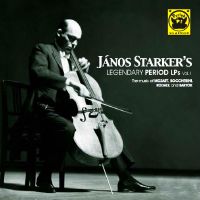
Unrivalled
János Starker plays Bartók, Boccherini, Kodály, Mozart and Leo Weiner -
reviewed by
HOWARD SMITH'... instrumental artistry at its finest.'
|

|
One of the 20th century's greatest cellists, Hungarian János Starker has outlived his most eminent contemporaries -- among them: Emanuel Feuermann (1902-1942), Gaspar Cassado (1897-1966), Pablo Casals (1876-1973), Gregor Piatigorski (1903-1976), Leonard Rose (1918-1984), Pierre Fournier (1906-1986), Jacqueline du Pré (1945-1987), André Navarra (1911-1988), Maurice Gendron (1920-1990), Paul Tortelier (1914-1990), Zara Nelsova (1918-2002) and Mstislav Rostropovitch (1927-2007).
A graduate of the Franz Liszt Academy of Music (Budapest) he was subsequently principal/soloist for the Budapest Opera House and Philharmonic, The Dallas Symphony, Metropolitan Opera (New York) and The Chicago Symphony Orchestra, the latter two with Fritz Reiner.
Since 1958 he has been concert artist, lecturer, teacher and Professor of Cello at University of Indiana.
Starker does not have the plush, grandly-nourished Russian tone of a Rostropovitch, but an intensely focused, unerring laser-like sound; the aural distillation of Hungarian folk dance, colourful cifrasz'r, cornfields, village life and living -- of paprika-based dishes, zöltött káposzta, mushkazone and Hajós-Baja wine.
Starker himself describes it thus -- 'My sound is clean and centered, therefore it has a certain lean quality. That leanness does not coincide with the cello sound that people get accustomed to. When you achieve a clear, focused sound it eliminates that 'mushiness' you get by vibrating so widely that the playing sounds out of tune.'
'The cello literature was just emerging (from the shadows) at the time that violin technique had reached its zenith', says Starker. 'You might say that cello playing started its greatest development with the six concerti of Boccherini -- but as a technical instrument it's about a century behind the violin and the piano.'
Note that this is demonstrably no longer the case, and since Starker voiced these opinions in the early 1970s, the cello has enjoyed a seemingly unstoppable renaissance; spurred on to some extent by Jacqueline du Pré and Mstislav Rostropovitch.
Continue >>
Copyright © 25 September 2007
Howard Smith, Masterton, New Zealand

|

